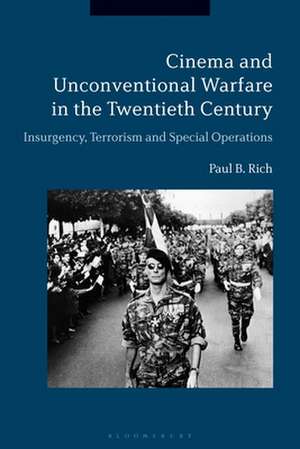Cinema and Unconventional Warfare in the Twentieth Century: Insurgency, Terrorism and Special Operations
Autor Dr. Paul B. Richen Limba Engleză Paperback – 19 feb 2020
| Toate formatele și edițiile | Preț | Express |
|---|---|---|
| Paperback (1) | 225.12 lei 6-8 săpt. | |
| Bloomsbury Publishing – 19 feb 2020 | 225.12 lei 6-8 săpt. | |
| Hardback (1) | 716.07 lei 6-8 săpt. | |
| Bloomsbury Publishing – 22 aug 2018 | 716.07 lei 6-8 săpt. |
Preț: 225.12 lei
Preț vechi: 289.09 lei
-22% Nou
Puncte Express: 338
Preț estimativ în valută:
43.08€ • 46.78$ • 36.19£
43.08€ • 46.78$ • 36.19£
Carte tipărită la comandă
Livrare economică 22 aprilie-06 mai
Preluare comenzi: 021 569.72.76
Specificații
ISBN-13: 9781350151192
ISBN-10: 135015119X
Pagini: 280
Ilustrații: 3 bw illus
Dimensiuni: 156 x 234 x 19 mm
Greutate: 0.39 kg
Editura: Bloomsbury Publishing
Colecția Bloomsbury Academic
Locul publicării:London, United Kingdom
ISBN-10: 135015119X
Pagini: 280
Ilustrații: 3 bw illus
Dimensiuni: 156 x 234 x 19 mm
Greutate: 0.39 kg
Editura: Bloomsbury Publishing
Colecția Bloomsbury Academic
Locul publicării:London, United Kingdom
Caracteristici
It has a global focus, including case studies from the United States, Britain, Ireland, France, Italy and Israel
Notă biografică
Paul B. Rich is the editor of the journal Small Wars and Insurgencies and does consultancy work for TRENDS: Research & Advisory. He has taught politics and international relations at the universities of Bristol, Warwick and Melbourne, and has published extensively on insurgency and counter-insurgency, terrorism and warlordism.
Cuprins
List of FiguresPrefaceIntroduction1. Cinema's Encounter with Colonial "Emergencies"2. Special Operations on Screen3. Counter-Terrorism, Spectator Sport Warfare and Drones 4. Italian Neorealism and Beyond5. The Mercenary Subgenre and Counter-Insurgency6. France's Bitter Retreat from Empire 7. Israel and Reframing Siege Warfare into Counter TerrorismEpilogueSelect FilmographyBibliographyIndex
Recenzii
I highly recommend the book to anyone interested in military film studies or, more specifically, the connections between film and culture in unconventional wars. Paul Rich has also marked out starting points for future lines of inquiry in film studies.
Cinema is a reflection of popular attitudes and cultural values. Paul Rich shows how filmmakers responded to modern unconventional 'dirty' warfare. From the obsession with Second World War (and later) Special Forces through wars of decolonisation to contemporary terrorism, Rich ably sets American British, French, Italian and Israeli cinema against the context of the events depicted. It is a major contribution not just to film history but also to understanding of how evolving conflict has impacted upon our consciousness.
Cinema is a reflection of popular attitudes and cultural values. Paul Rich shows how filmmakers responded to modern unconventional 'dirty' warfare. From the obsession with Second World War (and later) Special Forces through wars of decolonisation to contemporary terrorism, Rich ably sets American British, French, Italian and Israeli cinema against the context of the events depicted. It is a major contribution not just to film history but also to understanding of how evolving conflict has impacted upon our consciousness.
